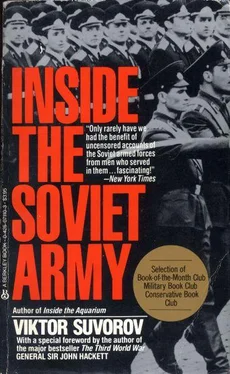The road to an Academy is a hard one. First, one must have commanded at least a company. Secondly, the sub-units under your command must achieve excellent ratings for two years (which means that you must lay in enough vodka and proceed to pour it into the commissions which come to check you until they are afloat with it — assuming, of course, that they consent to drink with you at all). Thirdly, approval for your application for entry is required from all your superior officers up to and including your divisional commander. Any of these officers has the right to stop your application from going on to his immediate superior. If one of them does so you will have to wait until the following year and your battalion or company will have to maintain its excellent record. Finally, you will have to pass examinations, a medical commission, and interviews and, thereafter, succeed against the competition within the Academy itself.
Unless an officer manages to secure a place at an Academy, he will never command more than a battalion. If he is successful, he has three years of intensive work on a very wide-ranging and detailed curriculum. After graduation, wide horizons stretch before him. Quite young majors are frequently made regimental commanders, or, failing that, deputy regimental commanders, as soon as they have completed the course. Whatever happens the path upwards is now open.
2
Towering above all the Academies is the General Staff Academy. Entry to this is tree of all the competition, examinations, applications and other problems involved in admission to the others. Everything is done for you by the Administrative Department of the Central Committee of the CPSU. The Central Committee selects those who will head the Red Army in the immediate future from among all the colonels who show promise and who are truly dedicated to the regime.
Of course, all the entrants to the General Staff Academy have already studied at a Higher Military Training College and then at the Frunze Armoured or Air Academies, or at one of the others.
The lowest rank held by entrants is colonel and there are often several colonel-generals on the current list of those attending. Commanders of Armies, Military Districts, Groups of Tank Armies, Flotillas and Fleets are often invited to visit the Academy by the Central Committee.
Having completed his studies at this Academy, a general will rise higher and higher, leaving his former rivals far behind.
1
`How fine to be a General' runs a line from a popular song. And, indeed, seen from below, the life led by a general does seem to be a quite sublime existence.
A Soviet general enjoys a great many privileges. If he wishes, he can acquire his own harem. Soviet ideology will not stand in his way. Every divisional commander, every Army, Front and Military District commander has signal units, communications centres and telephone switchboards under his command, staffed by attractive girls who have been security-vetted. The general is their absolute master. He guards them jealously against the attentions of others.
While I was with the 24th Division, a senior lieutenant who was a friend of mine, became friendly with an attractive girl from the divisional communications battalion. He was hauled before an Officer's Court of Honour which sentenced him to revert to the rank of lieutenant. The girl was dismissed from the army, immediately. He had to face a charge of having attempted to penetrate the divisional communications centre, in which there were secret command channels and she was accused of complicity. Both were enormously relieved when these accusations were dropped and delighted to have escaped as lightly as they did. This episode served as a lesson to the whole division. During the same period, the divisional commander, in order to ensure that he kept in touch with the girls under his command, organised a number of them into a shooting team. On their days off, he would pack his `markswomen' into his car, take them off to the divisional firing range and train them, personally, there. Imagine the scene — a vast, empty stretch of country in the Carpathian mountains, a huge area, carefully guarded and completely shut off from the world. Thickly wooded mountains, rocky slopes intersected by streams rushing downhill over rapids — without a living soul for miles around. On Sundays, our general was joined at the range by the local Party bosses, who used to bring their own girls from Lvov. He trained them, too. He was quite a man…
On a rather higher level, the entertainment of generals in the Soviet Army is catered for by professionals. Every Military District, Group of Forces and Fleet has its own troupe of singers and dancers. These are made up of professional performers, who are under contract to the Armed Services. They are subject to military discipline, for they are employees of the Armed Services just like the Army's doctors, nurses, typists and so forth. The Army is a more generous employer than any others. The girls in these ensembles-singers and dancers — are kept continuously and intensively at work entertaining the command staff. Generals' dachas have long since been transformed into temples dedicated to the worship not of Marx and Lenin but of Bacchus and Venus.
Athletically inclined young girls, especially gymnasts, are in special demand among our military leaders. The Army's Central Sports Club is one of the largest and richest in the USSR. Girls who have no connection whatsoever with the Armed Services can join this organisation and have all their living expenses paid. Sport in the USSR is an entirely professional affair. Sportsmen or sportswomen are paid, fed, clothed, and given decorations, accommodation and cars for their services — and the better they are the more they are paid. But their free and easy life must still be paid for by the athletes themselves. The girls pay in kind, becoming involved in prostitution while they are still very young. Those who are most amenable, as well as those who are most talented, are led by their coaches to the highest realms of professional sport.
2
What more can the generals want from life? Their dachas are huge and luxurious. Marshal Chuykov's dacha, for example, was built for him by two brigades of engineers, each of four battalions. More than 2,500 men were involved and they had the use of the best military engineering equipment.
Our military leaders fly off on hunting trips in helicopters, which they then use to drive game through nature reserves. They are given everything they need — quarters, cars, and all the cognac and caviare they want. Surely theirs must be a perfect existence? And yet the number of senior military leaders who commit suicide is exceptionally high. Of course, they do not shoot themselves when they become too fat or sated to go on but when rivals seize them by the throat and wrest their power from them.
During the Great Purge, 33,000 officers with the rank of brigade commander or above were executed in a single year. `But that was in Stalin's day' I shall be told — as if the very name of Stalin explains everything. But even since Stalin's day, generals have not been able to sleep peacefully at night. They are constantly plagued by uncertainty. Although Stalin is dead and gone, generals are still being offered up as sacrifices. The first victim was Lieutenant-General Vasiliy Stalin. He was thrown into a mental asylum immediately after Stalin's death and there he died, quietly and quickly. While his father was still alive, no one had diagnosed any abnormality. He was as strong as a bull; he was the only general of his rank in the whole Soviet Army who flew jet-planes.
After Stalin's death, Marshal of the Soviet Union Konev shot Marshal of the Soviet Union Beriya during a session of the Politburo itself. Next, Marshal of the Soviet Union Bulganin lost his rank and was driven in disgrace from his position at the head of the Soviet government. There was also the case of Marshal of the Soviet Union Kulik, demoted to major-general by Stalin, who had then sent him to prison and announced that he was dead. After Stalin, Kulik was released from prison and restored to his rank of lieutenant-general. He was promised promotion to Marshal if he could organise the design and production of the first Soviet intercontinental ballistic missile. He succeeded and in 1957 he again became a Marshal of the Soviet Union, although no explanation of his return from the dead was ever made public. When he received a telegram from the government announcing this and congratulating him, Kulik collapsed and died, from a heart attack, at the rocket range at Kapustin Yar. According to one story, when he received the telegram he shot himself.
Читать дальше












